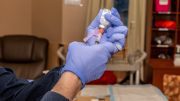You know flu season is just around the corner when the NWT’s top health official gets her flu shot.
Dr. Kami Kandola, the NWT’s Chief Public Health Officer, will be kicking off the NWT flu season by getting her annual flu shot Friday at the Centre Square Mall Vaccination Clinic in Yellowknife.
Last year, there wasn’t a single case of influenza recorded in the NWT, but officials say now that the masks are off and people are gathering again, the flu is expected to make a comeback this season.
According to government statistics, influenza and pneumonia are ranked among the top 10 leading causes of death in Canada. It is estimated there are an average of 12,200 hospitalizations related to influenza and approximately 3,500 deaths attributable to pneumonia annually. And Indigenous peoples are particularly vulnerable: The National Advisory Committee on Immunization (NACI) says Indigenous populations are more susceptible to catching the flu because of a high prevalence of chronic health conditions such as diabetes and cardiovascular disease combined with delayed access to health care, poor housing and overcrowding.
Most influenza vaccines authorized for use in Canada are made from influenza viruses grown in chicken eggs. NACI has concluded that egg-allergic individuals may be vaccinated against influenza using any influenza vaccine, including egg-based vaccines.
Flu shots are free in the NWT and those who are eligible can get a booster shot for COVID-19 at the same time. You can either book an appointment online or call your local health centre by clicking here.









